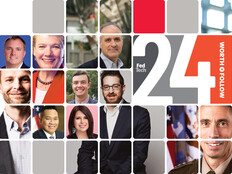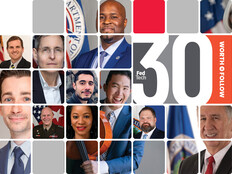Will Chatbots and AI Replace Federal Customer Service Reps?
The image of a stodgy federal bureaucrat who can’t answer your question may be an unfair stereotype, but in the near future they might start disappearing at a rapid clip. What will replace them? Chatbots — automated and intelligent messaging services that can hold conversations with users.
Last month, Booz Allen Hamilton, a consulting firm that works extensively with the federal government, and Conversable, a company that helps enterprises create intelligent conversational messaging services, unveiled a partnership around chatbots, which take advantage of artificial intelligence.
The companies said both customers and those interacting with the government are demanding more advanced messaging channels and want to get intelligent responses to their queries faster. Specifically, the companies announced in a statement that they are working on “a joint strategic focus to advance, test and deliver world-class automated interactive messaging, tools, services,and experiences that fundamentally enhance and transform customer care in all channels.”
How can chatbots and AI aid the federal government? The goal is to make customer service more seamless and intuitive, eliminate call centers and cut operational costs. “The federal government is uniquely positioned and motivated to seize the opportunity and deliver on the promise for self-service,” Michael Isman, vice president of Booz Allen's Strategic Innovation Group, told FedScoop.
Booz Allen and Conversable claim that within the next five years, “messaging will become the preferred path” for customer service interactions, and will replace call centers.
Pushing for AI in Customer Service
The companies will focus their efforts on creating “integrated and tailored” customer service, by “resolving requests and offering more adaptive self-service through automation to better serve customers within their preferred channels, while reducing complexity, time and cost.”
Another goal of the partnership will be to give those seeking customer service from the federal government “instant access to content, products and services.” The technology will be aimed at creating more interactive experiences while also using the chatbots to deliver more on-demand customer service.
As messaging, natural language processing, machine learning and AI technologies evolve, the companies expect agencies to move away from mobile applications that only have one function.
Instead, Booz Allen and Conversable are pushing “bots and automation in messaging to better analyze and understand customer requests, and reach out to new consumers who are rapidly becoming more adept and comfortable with executing commerce through more robust, tailored, responsive and secure messaging platforms.”
Chatbots in the Government
Chatbots that take advantage of AI to carry on intelligent conversations with citizens can help make the interaction between citizens and agencies more positive and responsive.
“It actually ... makes the experience more tailored to the individual and, you know, avoids the sort of endless response loops and those types of things that go on in customer service channels today,” Isman told FedScoop.
Isman said that Booz Allen is pushing its federal agency customers “to actually move into these areas because not only does it simplify the interaction with citizens, it’s actually a cost-reduction opportunity around these programs.”
In late June, DigitalGov University, the events arm of DigitalGov (a platform run by the General Services Administration's Office of Citizen Services and Innovative Technologies), a repository of public information on federal digital services, hosted a panel on AI chatbots in government.
The potential exists for the government to use AI chatbots to draw on the data that the government has to answer citizens’ questions.
Justin Herman, the lead for open government and SocialGov efforts at GSA’s Technology Transformation Service, said at the event that some agencies are fielding hundreds of questions per day on digital channels, said, according to ˆ.
“What happens when it becomes thousands of questions a day?” Herman said at the event, FCW reported. “[Customers] have every right to expect meaningful and timely information brought to them. It’s information that we have.”









